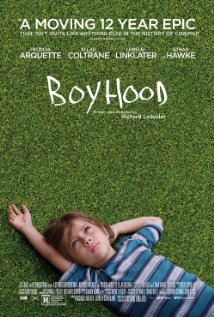Tags
"Boyhood", Elijah Smith, Ellar Coltrane, Ethan Hawk, Lorelei Linklater, Patricia Arquette, Richard Linklater

Boyhood ****
The reviews of the new, independent film Boyhood have been almost exclusively positive, and, in most instances, the film has been acclaimed as one of the year’s best movies.
Ann Hornaday of the Washington Post, a reviewer with whom I find I frequently agree, concludes, “As a film that dares to honor small moments and the life they add up to, Boyhood isn’t just a masterpiece. It’s a miracle.”
NPR‘s Bob Mondello writes, “The picture is so unassuming and understated as it wends its way through a dozen years in the life of this family — in all our lives, really — that you’re likely to be surprised at how invested you feel — how proud and conflicted — when Mason finally stands on the brink of adulthood.”
Andrew O ‘Hehir, Salon.com: “There isn’t anything else quite like Boyhood in the history of cinema, although that wouldn’t matter one-fifth as much if it weren’t a moving and memorable viewing experience in the end.”
And NYTimes critic Manohla Dargis says, “Radical in its conceit, familiar in its everyday details, Boyhood exists at the juncture of classical cinema and the modern art film without being slavishly indebted to either tradition. It’s a model of cinematic realism, and its pleasures are obvious yet mysterious. Even after seeing the film three times, I haven’t fully figured out why it has maintained such a hold on me, and why I’m eager to see it again. There are many reasons to love movies, from the stories they tell, to the beautiful characters who live and die for us. And yet the story in Boyhood is blissfully simple: A child grows up. This, along with the modesty of its physical production — its humble rooms, quiet moments, ordinary lives — can obscure Mr. Linklater’s (writer/director) ambitions and the greatness of his achievement.”
For me, Yes and No.
Richard Linklater’s idea and use of the same actors and actresses over a 12-year period to tell the story of a family and particularly of a five-year old boy’s journey to 18 is new and makes for wonderful, seamless film making. Before your eyes, Mason (Ellar Coltrane) changes, matures, and traverses the hurdles his family and life put before him.
It is quite an achievement to choose someone at the age of five who is able to so wonderfully play the role of Mason for the next 12 years. And so too with many of the other actors and actresses (Patricia Arquette as the mom, Ethan Hawk as the dad, and Lorelei Linklater as the sister Samantha).
Where I found myself less enthusiastic than the reviewers above about Boyhood is in the story itself. Nothing remarkable happens in the two hours and forty-five minutes of the film. For some, that is one of the charms of the film. For me, I found myself wanting to be more challenged and engaged by the 12-year journey.
At dinner following the film, Ellen and I had a difficult time coming up with what we thought Linklater was telling us. Perhaps he was simply presenting a largely unremarkable story in a new way. If that was his purpose, he did it well.
Perhaps the hype about the movie ahead of seeing it was a spoiler in some ways. Had we just stumbled across this independent film, as we seem to do with many others, we might have felt differently about it. That may not be fair to Linklater, to his own long journey to make the film and to his wonderful cast.
So we were glad we saw it.
But, for us, it wasn’t a “miracle,” a “masterpiece,” or as “memorable” as we were led to believe it would be. Nor did we think it was the “best film of the year.”


Nancy Cedar Wilson said:
I liked it alot! Partly because it was so ‘true-to-life’ in capturing those immediate moments in between larger ones.
The fact that Mason encountered disappointments in his parents, and sort of accepted their vulnerabilities, embracing his own—dealing with painful puzzling loss (of his first real relationship) facing big questions of life’s deeper meaning–and coming up with just another segue into another stage of his life—isn’t that LIFE?
Diana Bunday said:
I definitely agree more with you and Ellen. I thought the movie to be good, good acting and true to life, but i kept trying to figure out what about boyhood and maleness it is trying to tell me. It is not very favorable for man hood as most of the men were poor examples of adult men.
Good but not great.